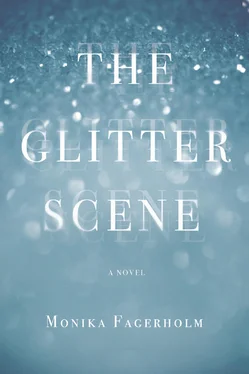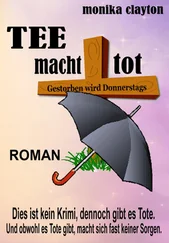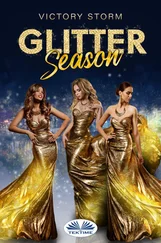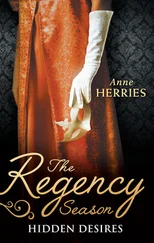•
Though there are of course other versions of how things went when Susette started going to the newsstand at the square in the town center and hanging out with Maj-Gun again, Maj-Gun’s own, for example.
The square, it is empty there in the afternoon and evening, in the summers too, on weekdays when the vacation period is over. An almost ghostlike emptiness hangs over it. Sometimes the only things that break the silence are cars that drive up, around around the square: three–four cars, often the same ones, hayseeds inside them. They roll down the windows, honk, yell, and if you happen to be on the square then you end up in the center, captured, for a few minutes, in a circle.
Susette ends up in the middle of the circle, maybe one of those evenings, possibly actually the evening after the day when Susette has been in the cousin’s house on the First Cape and found the old man the cousin’s papa beaten and unconscious on the kitchen floor. She cannot say for sure as said but it could have been that evening because it was fairly early after all and for once she was in no hurry to get anywhere.
She has a clear memory of it—because she had been working almost every day that summer from morning till night sometimes, at the usual places, with or without Solveig and then with Solveig in the afternoons and often later on overtime at Rosengården 2.
But this evening in particular they are free because they have not been able to go to Rosengården since the old man, Solveig’s relative the cousin’s papa from her childhood home, had died or is dying at the hospital and Solveig has to be there.
Susette who comes from the cousin’s house after the ambulance and Solveig have left; it is Susette herself who has offered to clean up the house, suddenly felt so sorry for Solveig, which she still has not said directly to Solveig because she and Solveig do not talk to each other in that way and Solveig herself has also been as calm, almost unaffected as usual.
“I want to,” is all Susette said when Solveig offered to give her a ride up to the town center.
She remained in the house for a while, but then later still without the energy to take care of anything at all after everyone had left, the exhaustion had suddenly rushed through her body. Left, her as well, walked along the road up to the main country road until the evening bus from the Second Cape came along and she jumped on it, empty that too, and rode it up to the square in the town center.
Got off the bus at the square, started walking to the other side in order to continue along the walking path through the small town center and then turn off on the pedestrian and bicycle path past the church and the old and new cemetery up to the northern hills and the apartment complex where she lives. But at the square, the cars that were suddenly there, had driven up and encircled her, around around for a few laps so that she had to stand still and wait until they finished. Windows were rolled down, shouts, that she was cute, that sort of thing.
Stares in front of her, it takes time: suddenly someone else who is shouting, waving—from the newsstand on the other side, right across from her. That is of course whom she is staring at even though she is not even aware of it herself while all of the other stuff is going on around her. Maj-Gun of course. Maj-Gun Maalamaa.
Susette in cowboy boots, tight jeans, short jacket, her long hair hanging loosely—and big, big eyes. “Djessuss, Susette. You’re totally spaced out. You don’t seem to have a clue about what kind of signals you’re sending out.”
Naturally it is Maj-Gun who says it, making Susette aware of what she looks like from the outside. When Susette walks up to her after the cars drive off, Maj-Gun true to habit is standing in the doorway, smoking. “My God, Susette.” Maj-Gun rolls her eyes, whistles. “A small poor child I am in farm pants, boots . Djeessuss, Susette. And those eyes. Your eyes, Susette. Like globes. A whole world—
“But close up like this you can see your age as well. And the fatigue, the wear,” Maj-Gun adds, but Susette does not get mad at her, just the opposite. For a brief moment she thinks “so true” and that Maj-Gun sees it too. Fatigued feet and—so empty, suddenly. All the death, fresh death , the old man on the floor in the kitchen of the cousin’s house, in her body, in her hands.
“Do you want some chocolate? I have a lot of samples today! Hearts, Susette. Small spirited trolls with truffle filling—”
Maj-Gun holds the door open, they walk in. And yes, it is nice coming into the newsstand, not like having wandered a long way and coming home, but just being able to leave the everyday for a bit. Step out of it, to the newsstand—Maj-Gun’s stronghold, her kingdom.
“Those boys,” Maj-Gun says, almost motherly, “pistol awakening . The hayseeds in the cars. Are a bit obtrusive but, Susette, you don’t need to be afraid of them.”
“Afraid?” Susette looks at Maj-Gun blankly.
But Maj-Gun is not paying attention, Maj-Gun at the newsstand, in the place “pistol awakening,” what she wants to talk about for example and all sorts of other things she has been waiting to share with someone and now with Susette as audience, it pours out.
“My father the Pastor called it that. They drink milk and don’t watch television and keep their wives on the straight and narrow having babies, strongly believe in Our Lord’s Salvation but then they go out into the backyard and shoot at cans and bottles. They are TRIGGER-HAPPY, pang pang pang .
“Or however it goes. But when papa Pastor told me about it it was funny, but now, djeessuss , Susette, I’ve been sitting here so long, I don’t remember anything from the rectory and all of papa Pastor’s fun stories at the dinner table, or my brother’s, the human rights lawyer , Tom Maalamaa.
“Don’t remember anything. Empty slate. Tabula rasa.”
In other words this is how Maj-Gun will stubbornly claim to remember how things were when Susette came to the newsstand for the first time.
“… The fear, Susette. Your fear. How I saw it. Your big eyes. And I stood here and reeled it in.”
“I wasn’t scared—” Susette objected, but futilely, you have to give in, keep your mouth shut, Maj-Gun does not want to hear that either.
“Well, whatever you were,” Maj-Gun continues, whistling. “When I saw your eyes I thought… like globes. A whole world. Something in them that reflects, so to speak. You can see yourself in them. That was a compliment, Susette. Hasn’t anyone given you that compliment before?”
•
All About Animals in Nature, All About Relationships, A Hundred Years of Psychoanalysis and Personal Development, Everything About Being in a Good Mood and Everyday Interactions, The Nuclear Family and the Dog, Aquarium Fish in Four Colors, All About Dogs, Cats’ World, Everything About the Underwater World of the Sea , and The Joys of Motherhood .
And then, Maj-Gun, at the newsstand, the fall of 1989. Maj-Gun among all of the magazines and newspapers that she lugs around and lines up on the shelves behind her and in front of her on racks and on both sides of the counter. Separates new issues from old issues that have not been sold; she gathers them in bundles and ties them with sharp ribbon in the back room to be returned to the Head Office from where a car comes and picks them up regularly a few times a week.
And reads them herself of course: new magazines and old magazines and certain particularly interesting issues she plows through from cover to cover during long, uneventful days before the evening rush hour and what she calls the “weekend whirl,” the hours leading up to the weekly lottery ticket deadline that takes place on Friday afternoon.
Читать дальше











